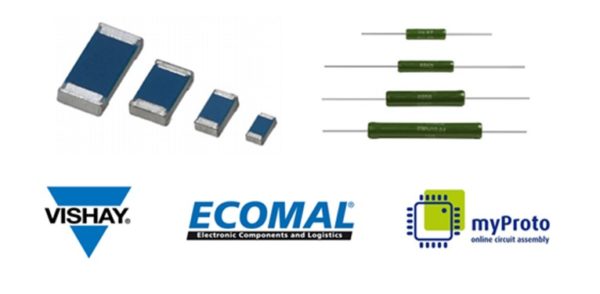Neuigkeiten

myProto has had a very strong partnership with Ecomal for many years. Ecomal is an electronics components supplier with a well-organised distribution network in sixteen countries. Because of this cooperation we always have Vishay resistors in stock and can offer them at competitive prices. Vishay’s resistors are known in the market as very accurate and stable.
The online PCB Assembly service of myProto is also known for speed, quality and a competitive price. We can only achieve this with an optimized logistics chain with strong partners like Ecomal. We therefore recommend using Vishay for the resistors.
In order to select the right Vishay resistor for your application, we have listed a number of tips for you.
The electrical property of a resistor is the resistance. It is the resistance that will oppose or limit current flow. It is identified on a unit ohm (Ω).
Current measurement resistors generally have impedance values in the range of several milliohms. To reduce impedance the resistor’s solder pads are also often located on the long sides of the component.
The Resistor Power Rating (sometimes called the Resistor Wattage Rating) is defined as the amount of heat that a resistive element can dissipate for an indefinite period of time without degrading its performance. Therefore one should take care to choose a resistor with sufficient power rating, selecting 0.5W when 1W may be needed will result in failure in time.
Another important classification to consider when choosing the resistance is the voltage value. Datasheets give limits to the maximum working voltage. This is the actual voltage applied over the resistor.
There is no perfect resistance, so tolerance must also be taken into account when choosing the resistance. Resistors come from different tolerances such as 10%, 5%, 1%, 0.1% and so on. myProto works standard with 1% tolerance resistors.
When selecting the resistor, do not forget the operating temperature range. The temperature coefficient is also stated in the data sheet.
The mounting style is also a factor in the choice of resistors. You may need surface mounting device or a through hole component. The decision for this is sometimes determined by the application, the power or the availability of the part. Physical size is also an important consideration, especially in products where the space is critical. Chip resistors such as 0402, 0603, 1206, 1210 etc. are smaller in size but limited in power and voltage. Through hole resistors, heatsink mount or chassis mount are bulky but offer higher power dissipation and voltage rating.
For the automotive industry there are special resistors. These resitors can be recognized by the AEC-Q200 certificate. These resitors are suitable for automotive applications.. The AEC-Q200 certification ensures that the components resist to the harsh automotive environment, requirements are related to very high resistance to temperature and vibration and to protection against short circuiting.
Thin and thick film resistors are the most common types in the market. They are characterized by a resistive layer on a ceramic base. Although their appearance might be very similar, their properties and manufacturing process are very different. The naming originates from the different layer thicknesses. Thin film has a thickness in the order of 0.1 micrometer or smaller, while thick film is around thousands time thicker. However, the main difference is method the resistive film is applied onto the substrate. Thin film resistors have a metallic film that is vacuum deposited on an insulating substrate. Thick film resistors are produced by firing a special paste onto the substrate. The paste is a mixture of glass and metal oxides. Thin film is more accurate, has a better temperature coefficient and is more stable. It therefore competes with other technologies that feature high precision, such as wirewound or bulk metal foil. On the other hand, thick film is preferred for applications where these high requirements are not critical since prices are much lower.
The pulse proof, high power thick film chip resistors series is the perfect choice for most fields of power measurement electronics where reliability, stability, high power rating and excellent pulse load performance are of major concern. Typical applications include battery management systems in automotive appliances.
Precision thin film flat chip resistors are the perfect choice for most fields of modern electronics where the highest reliability and stability at high operating voltages are of major concern. Typical applications include industrial and automotive inverters, voltage measurement systems as implemented in battery management systems, and test and measurment equipment. Thin film resistors are more precise than thick film resistors, thin film resistors in general come with 0.01% tolerance and 5ppm but there are also thin film with 1% tolerance and 50ppm available.
Another form of SMD resistor that can be used is known as the MELF resistor – Metal Electrode Leadless Face. These resistors are not nearly as widely used as the standard SMD resistors, but in some instances they provide advantages and can be used. SMD MELF resistors and their predictable behavior offer high reliability for functional safety requirements in automotive, industrial, power, and drive applications. Pulse and long term performance of SMD MELF resistors optimize voltage and small signal conditioning circuits in all kinds of metering, monitoring, and drive applications.
Watch this video for a head-to-head comparison:
Mitglied von




10% Preisnachlass bei Ihrer ersten Bestellung
Entdecken Sie myProto – der online PCB Bestückungsservice! Melden Sie sich nun an, erstellen Ihr Projekt und erfahren Sie unsere Geschwindigkeit, Qualität und Benutzerfreundlichkeit.
Nutzen Sie den code
für 10% Preisnachlass bei Ihrer ersten Bestellung…Kommen Sie auf den myProto Geschmack!